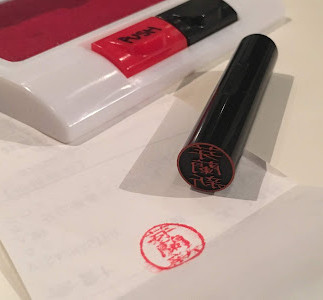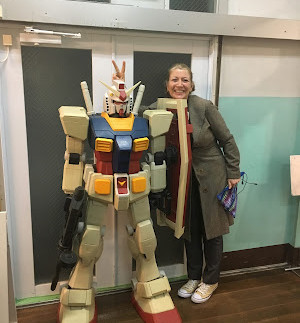Ever thought of doing business in Japan?
- Genna Revell
- Nov 19, 2023
- 7 min read
In October 2018, a Japanese business delegation from the city Fukuoka was shown around the Auckland start-up ecosystem. Fukuoka is Auckland’s Japanese sister city and the relationship is sealed with plenty of signed MOU’s to secure a strong trade between the 2 countries. The visitors ended up at Grid Auckland and I was asked to show them our product Magical Park. I mentioned that our games could be used for civil defence education and that sparked the visitors interest. A year later, Grid Auckland arranged for my company Geo AR Games to participate and represent New Zealand in the international Japanese Start-up competition Waraku Summit 2019. Spoiler alert, I didn’t we didn’t win the competition, but we made a lot of fabulous connections not just with Japanese start-ups and government officials but also with other start-ups such as a French animation and game studio, which I’ll give a special plug because they produce such beautiful artwork: Un je ne c'est quoi - Animation Studio.
So, let’s get to the point of this blog post which is “Why should NZ start-ups consider Japan as a market?”
Besides the fact that Japan is quite a bit bigger than NZ, which admittedly isn’t hard, Japanese people obey the law which means you and your product or services are protected by it. Unlike China, Copycats are still rare, and people pride themselves for their honesty and loyalty. Crime is very frowned upon and very rare. It makes living and working there a real pleasure.
Japan is generally, a premium market that allows a business to add decent margins to their prices. People are friendly and have very good manners which can sometimes get in the way when you try to get honest feedback for a product or service you want to introduce to the market. It is just so impolite to give feedback that could potentially upset people and so they rather nod and smile. One of our fellow start-ups told me they spent 25min in a meeting and the person nodded and smiled with great interest until they politely explained that the start-up CEO was in the wrong meeting and they weren’t the person the start-up was supposed to meet with. I think, your best bet to get honest critical feedback whether your product is ready for Japan is from an ex-pat who has lived in Japan for a long time and knows how the market works. If you are serious about entering the Japanese market, you need to have local input. Just like in China, Western market assumptions and validation won’t necessarily apply in Japan. Forget what you know about your product and what you have validated and start from scratch. Be open to understand why Japan works the way it does. Also, if you understand China, then you still don’t understand Japan and vice versa.
Let me give you an example. Japan is a country of extreme contradictions. You have on one hand the latest and greatest technology and on the other hand, people still get wowed and excited by the latest fax machine developments and yes, businesses still use Fax machines on a daily basis in Japan!
A lot of restaurants only take cash and no credit cards, and in order to get a meal, in some restaurants you have to purchase a ticket from a vending machine outside the restaurant first and then you can exchange it for a meal inside the restaurant. You have the extreme Japanese fashion trends and the conservative traditions like women should always wear heels to work and never flat shoes. Gender stereotypes are strong and everywhere but because you are a foreigner, even if you are female and don’t wear high heels, you are being highly respected and treated graciously. Everyone will nod, smile, bow and try and bend over backward to deliver exceptional service.
Because Fukuoka city is Auckland’s sister city, it is extremely easy for NZ start-ups to move to Fukuoka which is the fastest growing city with the youngest population and has the most number of start-ups in the entire of Japan. It is not very touristy; the accommodation cost is lower than in Tokyo. Because Fukuoka is the start-up hub of Japan, the city makes it easy for New Zealand Start-ups to migrate. Japan is also establishing a new smart city close to Fukuoka that they want to use as a testbed for new tech innovation.
Japan produces a lot of clever and smart people and surrounding yourself with them helps spark ideas and find solutions. There is definitely top technical expertise is in Japan and sadly, because of the language barrier, you often don’t hear about the inventions until a decade later. To give you an example, the keynote speaker of the Waraku Summit 2019 was Michihiko Iwamoto and his company Bring.org. He has worked for over a decade on breaking down any substance into its chemical components by only using enzymes and water and then recycling those very components into fuel, new clothes or plastic toys. Basically, he has solved the rubbish crisis we are drowning in and is showing us how to run cars or airplanes with the contents of your rubbish bin! But, because he, like many Japanese, doesn’t speak English, you will have never heard of him and his breakthrough and hopefully this post will prompt someone to translate some of his incredible successes in business as in science which are ongoing in Fukuoka.
And if you need an awesome translator in Fukuoka, ask for Jack James or email me and I put you in touch.
What else is awesome about doing business in Japan? The market is scalable and geographically it’s a good place to base a company if you want to expand into the rest of Asia. If you want to come as a start-up from New Zealand to Japan, you get offered a 6 months visa once a business plan has been submitted. In order to renew the visa, you need to open a business office or hire 2 or more permanent employees. Alternatively, you might have capital or investment exceeding Yen 5M (more than NZ$72K). The City of Fukuoka will also assist with an additional reduction in accommodation or office cost and with introductions to the market and the local network. If none of that works, you could simply apply for a 6-12 months working holiday visa instead.
What isn’t so great is that Japanese investors are more interested in domestic start-ups. That may again be due to the language barrier or their passion for their country.
In Japanese society traditionally failing is not an option, which explains why becoming an entrepreneur in Japan is a social risk. Some of the advice that was given at the Waraku Summit was that Japanese Entrepreneurs are better off to go overseas in order to fail safely and without the additional pressure from society.
Japanese are generally hard-working people and will aim to be at work before the boss and leave after the boss leaves. The minimum wage is very low in Japan, which is also why a lot of Japanese try and do overtime and get paid extra. The minimum wage is only Yen 874 per hour is which is about NZ$12.
Besides all the amazing people I got to meet along the way and the incredible hospitality from the locals, every Waraku Summit participant received a “hanko” which is a traditional personal stamp that spells the personal or company name in either Kanji or the Japanese writing Katakana or Hiragana. Our hosts tried to translate every persons first and or last name into Kanji to give it more meaning. My hanko spells sprout or seed, flower and new. I quite like that since I’m all about new ideas sprouting from seeds we sow. Same as in China, business documents are signed with a hanko, that is carved and acts like a fingerprint. A business hanko is registered at the city office, hard to fake, but because it is hand carved, it is also quite expensive if it is done properly and old-school.
Before and after my 3min start-up pitch, we met with officials from Fukuoka to show them our civil defence game and I expected a lot of politeness and not much critical feedback. However, we were informed that civil defence, or crisis management is such a serious topic, that in order to introduce the concept of teaching emergency management through games, school regulations would have to be changed. The senior officials who represented education and digital innovation seemed to truly love the game and had a lot of fun playing it too. The traditional school drill consists of evacuation in complete silence while the students wear padded hats to protect themselves. Fukuoka has a special earthquake education center schools visit to learn more about crisis management, but nevertheless, we were told that our messaging and gameplay exceeded what students learned in Japan. Again, hard to say if the people we met with were just trying to be polite…;D The city of Fukuoka is interested in running a pilot though if the New Zealand Ministry of Civil Defence agrees.
We have started building a relationship with Japan. On average, it takes about 3 years and constant presence and conversations to get to a point where you can discuss a contract. Make sure the same person keeps going back to Japan to strengthen the relationships. If it’s every time someone new, the process of building long term relationships will also take longer.
Just like in China, your business partner wants to see a local office in Japan and not just a long-distance relationship. I think it’s definitely something IT start-ups who can work from anywhere as long as they have wifi should consider and not just because the food is awesome!
If you want to know more about business in China, I have previously written 2 posts about start-ups in China too.
I also would like to shout out a special thank you to my amazing “chaperone” Fiona Haiko from ATEED. She made sure I was in the right place when I needed to be, translated everything with ease and incredible confidence and was the most fun companion on this trip I could have asked for! Thank you ATEED, Grid Akl and the city of Fukuoka! What an amazing experience and I’ll be back.














Comments